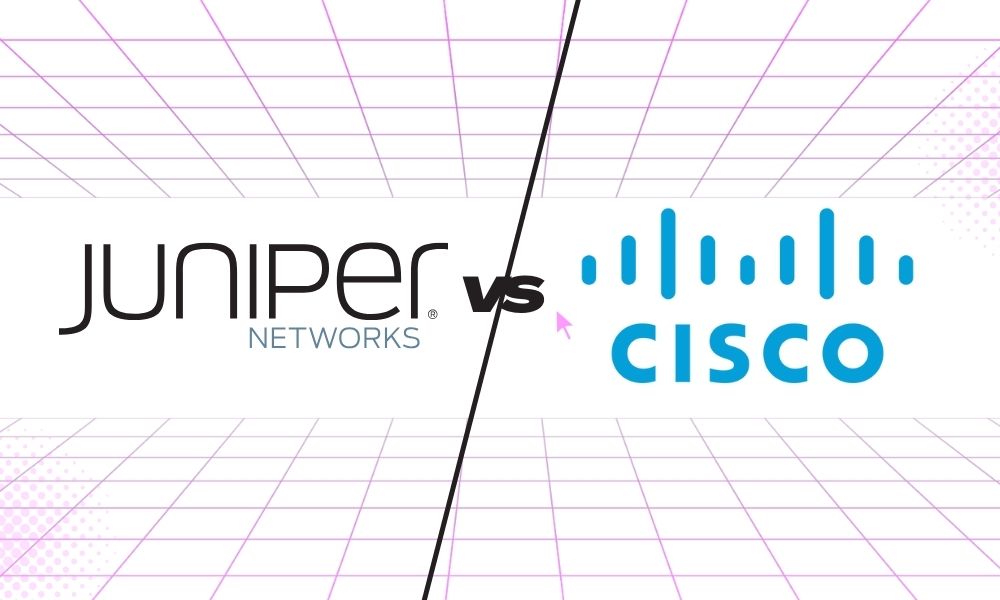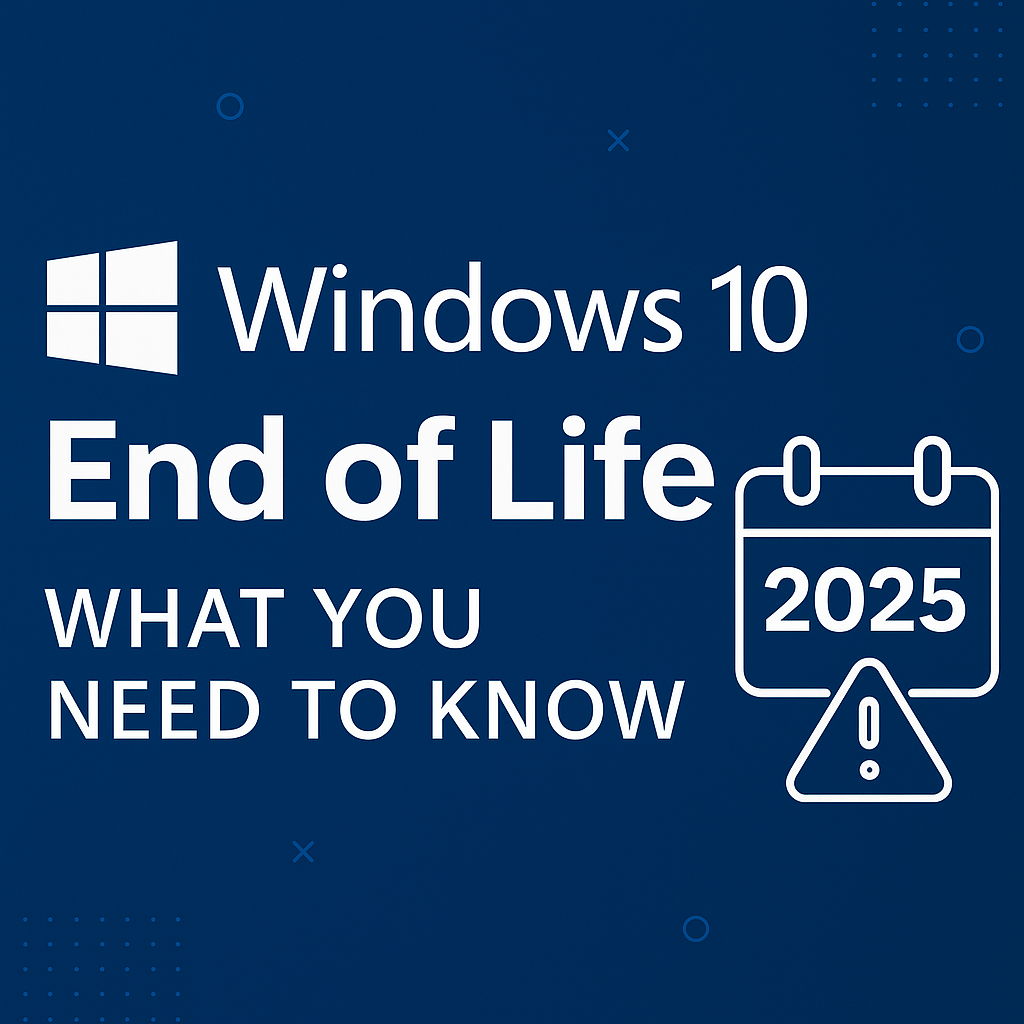When it comes to setting up a reliable and efficient network for your business, choosing the right provider can feel like a difficult decision. Both Juniper Networks and Cisco stand out as top contenders, each with its unique strengths in networking solutions. Whether you’re looking to enhance connectivity, boost security, or streamline management, these two tech giants have you covered.
Below, we’ll explore the differences and highlights of Juniper vs. Cisco, breaking down what each offers so you can determine which one aligns best with your business goals and needs. Let’s dive in and find the right fit for your network’s future.
Overview of Juniper and Cisco
Comparing Juniper vs Cisco starts with looking at their different capabilities and features. Juniper has deep experience in cloud computing, connected security solutions, and AI networking. In addition, Juniper has a broad portfolio of networking hardware specifically designed for modern technical infrastructure environments such as 5G networks, IoT applications and more.
On the other hand, Cisco has been a leader in IT products and services for years, offering simplified networking solutions that are reliable and secure. Cisco also offers an array of wireless technologies, routers, switches, and more which can be tailored to any size data center.
Customer Reviews and Support: How Cisco and Juniper Stack Up
Gartner’s peer review data highlights some key differences in customer feedback density between Cisco and Juniper. Cisco leads with an impressive 13,328 customer reviews, achieving a solid 4.4 out of 5 rating, reflecting broad satisfaction. While Juniper has fewer reviews, totaling 264, it holds a slightly higher rating of 4.6, suggesting a strong endorsement from its user base.
Both brands receive high marks of 4.7 for the advanced capabilities of their switch products, offering diverse, high-performing options tailored to meet varied organizational demands.
In terms of support, both Cisco and Juniper excel with dedicated 24/7 assistance. Juniper features a robust online help center packed with resources to help customers quickly locate answers, while Cisco complements its detailed technical documentation with live chat support, ensuring accessible solutions whenever issues arise.
Juniper vs Cisco: Major Players In The Networking Industry
Juniper Networks, located in Sunnyvale, California, have a variety of networking products like routers and switches as well as security and software-defined networking (SDN) solutions to businesses. Juniper offers an experience-first approach with products like the MX Series routers and EX/QFX Series switches. Known for its AI-driven solutions, Juniper emphasizes streamlined, multicloud operations, helping businesses interconnect data centers across reliable, programmable network fabrics. This approach aims to maximize efficiency and improve end-user satisfaction through simplified network management.
Cisco, headquartered in San Jose, California, offers an expansive range of products and services that include networking, data center, the Internet of Things (IoT), security & collaboration solutions tailored to suit organizations across multiple market segments. Its ASR Series routers are recognized for high-throughput performance suited to enterprises needing scalable solutions, while the Nexus and Catalyst Series switches provide extensive support for hybrid and multi-cloud environments.
Cisco’s technology portfolio integrates smoothly with AWS, Google Cloud, and private cloud systems, empowering businesses with reliable, secure connectivity and versatile options for network scaling.
Technical Specifications Comparison:
| Specification | Juniper MX Series Routers | Cisco ASR Series Routers | Juniper EX/QFX Series Switches | Cisco Nexus/Catalyst Series Switches |
| Port Configurations | Flexible 10/40/100GbE ports | 10/40/100GbE options | Supports 1/10/40/100GbE | Extensive 1/10/40/100GbE options |
| Throughput | Up to 40 Tbps (depending on model) | Up to 32 Tbps | Up to 13 Tbps | Up to 25.6 Tbps |
| Latency | <5 microseconds | Low-latency performance | <3 microseconds | Ultra-low latency |
| Scalability | Highly scalable, ideal for SDN | Scalable, suited for large networks | Supports multi-cloud environments | Multi-cloud and data center optimized |
| Automation Support | Integrated AI and automation tools | Strong automation features | Intelligent automation for operations | Extensive automation capabilities |
Juniper vs Cisco: Cost Comparisons
When comparing costs, Cisco is generally more expensive than Juniper, particularly for small to medium-sized businesses. Cisco offers Smart Licensing and subscription-based models that can raise the long-term total cost of ownership, especially as scaling needs grow.
Juniper, on the other hand, tends to offer more competitive pricing, especially appealing for larger deployments that prioritize scalability and performance. Additionally, Juniper’s straightforward licensing structure is often preferred by companies looking to avoid the complexities associated with Cisco’s licensing options.
For a tailored recommendation, consulting with a network expert is advisable to identify the best fit for your organization’s budget and technical requirements.
Cisco Networking Equipment and Security Features
Cisco networking equipment is used by many businesses to create reliable, secure, and high-performance communication networks. Cisco provides a full range of routers, switches, security appliances, and wireless solutions designed for reliability and scalability.
The company also offers several platforms, including Catalyst switches, Nexus switches, ASR routers, and Meraki wireless access points. In addition to networking hardware products, Cisco provides software solutions such as the IOS XE operating system for network routers.
Cisco’s network security solutions include Cisco ASA Firewalls and Firepower for advanced threat protection, both of which deliver real-time threat intelligence and intrusion prevention. Cisco also offers Advanced Malware Protection (AMP) to prevent malicious files from spreading and disrupting the network. Powered by Cisco’s Talos Intelligence, these features help ensure Cisco’s network solutions maintain high levels of security, safeguarding businesses from a wide range of cyber threats.
Juniper Networking Equipment and Security Features
Juniper Networks is a leading provider of high-performance networking equipment for enterprises of all sizes. Juniper’s portfolio includes routing platforms such as the Junos OS (the enterprise version of Juniper’s JunOS operating system), EX Series Switches, and QFX Series Switches.
Juniper also provides cloud networking solutions such as Contrail Enterprise Multicloud and Junos Fusion Fabric, enabling applications to deploy seamlessly across private, public, and hybrid clouds.
Juniper integrates strong security measures through its SRX Series Firewalls, which offer high-throughput performance combined with application-aware firewall policies and intrusion prevention. For advanced threat detection, Sky Advanced Threat Prevention (Sky ATP) uses machine learning to detect sophisticated attacks, while Junos Space Security Director provides centralized control and real-time visibility, allowing for streamlined policy enforcement across network locations.
Firmware and Operating Systems: Juniper vs Cisco
Juniper’s Junos OS, known for its modular design, uses a single-source code base across devices, making updates and management simpler. Its hierarchical command-line interface (CLI) offers structured, intuitive commands. Cisco’s IOS, built on a monolithic architecture, is widely compatible across devices, though it requires familiarity with its command syntax, which can vary by model.
Both companies issue regular firmware updates for security and performance, though Cisco’s updates are more frequent. Cisco and Juniper maintain proactive security advisory programs to address vulnerabilities, with Cisco’s Security Advisories and Juniper’s JSA keeping users informed of potential threats.
Juniper and Cisco both support flexible configuration, but Junos OS excels with a clear, hierarchical structure and rollback capabilities that simplify management. Cisco’s IOS provides strong support for automation, but Juniper’s configuration structure often appeals to those seeking easier oversight.
Juniper vs Cisco: Use Cases
Juniper and Cisco Networks provide tailored networking solutions for a range of industries, understanding the unique demands of sectors like healthcare, finance, education, and telecommunications.
Cisco Use Cases
Healthcare: Cisco’s SD-WAN and Meraki solutions allow healthcare providers to establish secure, reliable networks that comply with data regulations like HIPAA. With features like Direct Internet Access (DIA) and in-depth analytics, healthcare organizations can manage network traffic, ensuring smooth, uninterrupted access to critical applications and telemedicine services.
Finance: For the finance industry, Cisco’s SD-WAN architecture provides secure connections for branch offices, facilitating compliance and high-quality user experiences. By leveraging policy enforcement and advanced threat protection, Cisco helps banks protect financial data and support secure transactions, while providing optimized access to SaaS services like Salesforce or Office 365.
Juniper Use Cases
Education: With solutions like Mist AI for intelligent wireless management, Juniper meets the evolving needs of educational institutions, from K-12 to higher education. Juniper’s infrastructure supports high-density environments, ensuring students and staff have reliable access to resources and online learning platforms, with features that prioritize data privacy and user security.
Telecommunications: For telecom providers, Juniper’s high-performance routers and switches, including the MX Series, facilitate the delivery of 5G and next-generation services. Juniper’s open standards and scalable network fabrics help telcos expand coverage, optimize data flow, and maintain robust, efficient networks to meet the demands of high-bandwidth applications.
Cisco vs Juniper: Which Is Right For You?
Deciding between Juniper and Cisco depends largely on your business’s unique requirements and network goals. Juniper networks focuses on specialized, scalable solutions with an emphasis on automation and streamlined management. Juniper’s approach is particularly appealing for organizations needing flexible, high-performance networks and dedicated support for specific use cases, such as multicloud environments or high-security sectors like finance and healthcare.
Cisco, on the other hand, offers a vast, versatile product portfolio that caters to a broad range of industries and infrastructure needs. Cisco’s solutions simplify complex networking tasks, making them ideal for businesses seeking robust, all-encompassing support for hybrid, cloud, or large-scale enterprise environments. Cisco’s deep integrations with third-party platforms, along with extensive security options, make it a strong choice for businesses prioritizing compatibility and comprehensive support.
In the end, your choice between Juniper and Cisco will depend on factors such as scalability needs, preferred management style, and specific industry requirements. Evaluating these factors will guide you toward the solution that best aligns with your operational and strategic goals.
Frequently Asked Questions (FAQ)
1. What are the main differences between Cisco and Juniper?
Cisco offers a broad product range for large-scale, hybrid environments, while Juniper focuses on specialized, high-performance solutions with strong automation. Cisco emphasizes compatibility and support, whereas Juniper is ideal for organizations needing flexible, AI-driven management.
2. Which is more cost-effective for small to medium-sized businesses?
Juniper generally offers more cost-effective solutions for small to medium businesses, thanks to competitive pricing and simpler licensing. Cisco’s options can be pricier but come with broader support and integration options.
3. How do Cisco and Juniper handle network security?
Cisco’s security suite includes ASA Firewalls and Advanced Malware Protection with real-time threat intelligence. Juniper offers SRX Series Firewalls and Sky Advanced Threat Protection, with machine learning for threat detection. Both provide centralized security management tools.
4. Which solution is better for healthcare, finance, or education?
Cisco’s SD-WAN and Meraki solutions cater to healthcare, finance, and education with robust security and SaaS support. Juniper’s AI-driven firewalls and indoor location services offer strong network management for high-density environments in these industries.
5. Does Cisco or Juniper offer better support for multicloud environments?
Both support multicloud well, though Cisco offers more third-party cloud integrations. Juniper focuses on open standards and AI-powered management for flexibility in hybrid and multicloud setups.
Looking To Sell Juniper or Cisco Networking Equipment?
When deciding between Cisco and Juniper, it’s essential to consider factors like budget, scalability, existing infrastructure, and your team’s technical expertise. When it’s time to upgrade, exIT Technologies provides a seamless solution to sell your equipment, ensuring your transition is both profitable and worry-free.
At exIT Technologies, we make it easy to sell Juniper and sell Cisco networking equipment through a fast, hassle-free process. Our team of experts understands the value and technology of Juniper and Cisco products, providing full support to ensure you get the best outcome for your equipment. Trust us to handle your sale with expertise and care, giving you peace of mind every step of the way.



